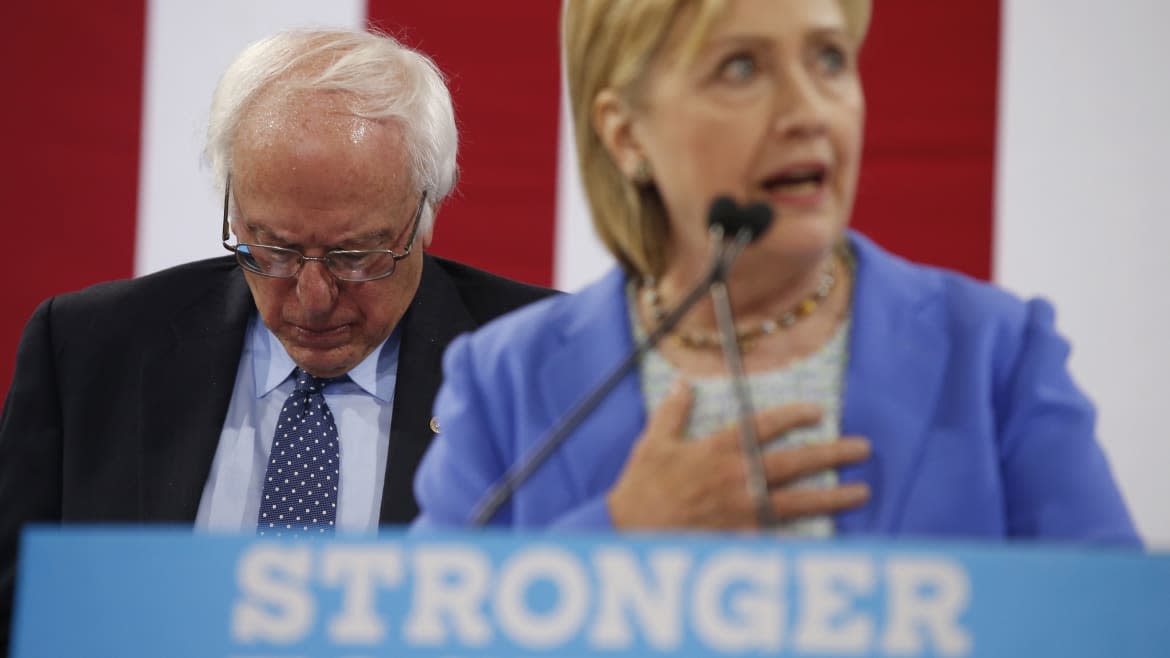The County That Took Down Hillary Just Canceled Bernie

We didn’t know it at the time, but Bernie Sanders’ upset win against Hillary Clinton in Michigan in 2016 was the proverbial canary in the coal mine, signaling trouble ahead for Clinton in the general election against Donald Trump.
Sanders’ loss and Joe Biden’s convincing victory there this year tees up the former vice president to deliver a knockout blow next week when voters go to the polls in Ohio, Illinois, and Florida, where polls show Biden with a big lead and as his coalition of black Americans and suburban women and moderate voters is expanding to include a significant number of working-class white men, once the core of Sanders’ support.
“Biden has a natural way of identifying with working-class Americans, which means the wave that started with Super Tuesday will only grow in this set of primaries, which makes it hard for Bernie,” says Democratic pollster Stan Greenberg.
Biden Seizes Bernie Battleground, Closes In on Trump Showdown
The story of Sanders’ loss in the state that vaulted him into serious contention four years ago can be explained through one issue—trade—and there’s no better person to tell that story than Greenberg, who has spent decades studying Michigan’s third most populous county, Macomb County, a largely white, working-class community that is home to the auto industry and that exit polls showed Biden carrying this year.
“Clinton lost Macomb in 2016 to Sanders and then lost it to Trump. Had she won Macomb as Bill Clinton did and Obama did twice, she would have won Michigan,” Greenberg told The Daily Beast. Instead, Trump won Macomb by almost 12 percentage points as Hillary lost the state by fewer than 11,000 votes.
It was Greenberg who famously dubbed these blue-collar union Catholic Democrats “Reagan Democrats.” After voting overwhelmingly for John F. Kennedy in 1960, they gave Ronald Reagan a landslide in 1980, but ideologically they never moved, “which is why (Bill) Clinton could win them back” in 1992 with more centrist cultural messages on crime, abortion, and welfare.
In 2016, NAFTA, the trade agreement that voters blamed for the loss of manufacturing jobs was the top issue. “NAFTA represented the whole elite corporate disregard of what was happening to working people, and they were particularly angry in Michigan,” says Greenberg. “Hillary was part of the administration and not wanting to offend Obama, she went silent. And he (Sanders) made trade very central, and it was picked up by Trump. It was a unique moment where trade was critical in deciding the general election.”
The trade issue has since transformed. Democrats hate the Make America Great world view with Trump’s trade wars and tariffs. The percentage of people in the country who believe trade is a good thing has jumped 16 points overall (and 10 points among Democrats) to 69 percent. The USMCA, the re-negotiated NAFTA won the endorsement of labor unions and passed Congress with strong Democratic support.
Those numbers explain the beating Sanders took in the state he needed to win. “It’s very hard to make a comeback on trade in the current climate,” says Greenberg. “He’s right on the history.”
If Biden maintains his momentum through his weekend’s debate and next week’s contests, the question will be what does Sanders do now? In the Las Vegas debate last month, he was the only one on stage who said the candidate with the most delegates at the end of the primary process should get the nomination even if he or she falls short of the 1991 delegates needed.
Sanders looked like the prohibitive frontrunner at that point, so his position seemed self-serving. Yet he said it again and with conviction in an interview last week with MSNBC’s Rachel Maddow. “If Biden walks into the convention or at the end of the process has more votes than me, he's the winner," Sanders said, later clarifying he meant delegates, not votes.
“Seems to me like he’s laying the groundwork pretty early for backing Biden if he has that big a win, and that big a delegate lead,” says Greenberg.
Contrary to Sanders’ allegation that the establishment forced out Biden’s competitors just ahead of Super Tuesday, Greenberg says with some awe that Democratic voters have taken over “and they’re utterly tactical. It’s all about defeating Trump.”
Democrats can’t afford a repeat of 2016 ,where Sanders stayed in too long and gave his delegates the impression that the convention could be contested. Sanders delegates booed various speakers, including Michelle Obama. “Fifteen percent of his supporters didn’t vote for Hillary and he got 46 percent of the vote, so that was a huge number,” says Greenberg. “I don’t blame Bernie as much as I do the Clinton campaign for not consolidating such a huge number of Democrats. They had an ad by Sanders they did not run.”
Greenberg estimates that 30 percent of Sanders voters are not guaranteed votes for the Democratic nominee, so how the remainder of the race plays out could have a big impact on the election, for good or for ill. If he can’t win a make-or-break state, and has no hope of overtaking Biden, will Sanders step aside?
Matt Bennett with Third Way, a moderate Democrat group that raised early alarm bells about Sanders, says voters are much clearer this year about what’s at stake. “Voting for Bernie and lashing out at the Democratic establishment or Hillary herself was cost-free in 2016, But doing it now brings the enormous risk of reelecting Trump.”
Few thought Trump could win in 2016. Now we know better, and the pressure on Sanders to do the right thing will only mount if he can’t rack up any wins.
Get our top stories in your inbox every day. Sign up now!
Daily Beast Membership: Beast Inside goes deeper on the stories that matter to you. Learn more.

